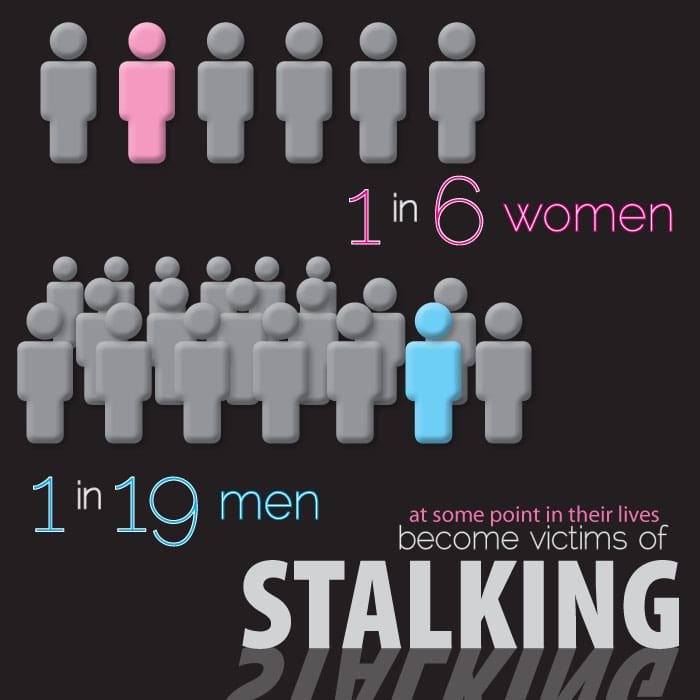- 'Stalking is much more about inducing fear,' says Brook Zitek, DO, a forensic psychiatrist at Temple University School of Medicine in Philadelphia. 'It's repeated boxes of candy, clothing, showing.
- What is Stalking? ‘Stalking’ is making repeated unwanted communications and contacts in a way that would cause apprehension or fear in most people. In most cases stalkers make unwanted communications using telephone calls, emails, text messages, posts on social networking sites, and letters and faxes.
Stalking is the act of repeatedly following, observing, or initiating contact with a person who has not consented to the behavior. Though some stalkers believe their intentions are innocent, their. Stalking is a pattern of activity, characterized by threatening behaviors that inflict psychological trauma on the victim, and may result in serious injury or even death. It is one of the tactics commonly used by batterers to terrorize survivors. However, it can also occur in situations where there has been no intimate relationship.
This post is also available in: Español (Spanish)
Stalking is a course of conduct directed at a specific person that would cause a reasonable person to feel fear. Unlike other crimes that involve a single incident, stalking is a pattern of behavior. It is often made up of individual acts that could, by themselves, seem harmless or noncriminal, but when taken in the context of a stalking situation, could constitute criminal acts. Legal definitions of stalking differ depending on where you live; however stalking is a crime under the laws of all 50 states, the District of Columbia, the U.S. Territories, and the Federal government. Stalking is serious, often violent, and can escalate over time.
What is Stalking?
While this list isn’t exhaustive, you may be a victim of stalking if someone:
- Repeatedly calls your phone, including hang-ups
- Follows you and shows up wherever you are
- Sends unwanted gifts, letters, texts, or emails
- Damages your home, car, or other property
- Monitors your phone calls or computer use, possibly through spyware
- Uses technology, like hidden cameras or global positioning systems (GPS), to track where you go
- Drives by or lingers near your home, school, or work
- Threatens to hurt you, your family, friends, or pets
- Performs other actions that control, track, or frighten you
- Uses other people to try to communicate with you, like children, family, or friends
If you have been stalked, you may:
- Be fearful of what the stalker is capable of doing
- Feel vulnerable, unsafe, or not know who to trust
- Feel depressed, hopeless, angry, anxious, irritable, on-edge, and hypervigilant
- Have flashbacks, disturbing thoughts, feelings, or memories
- Feel confused, frustrated, or isolated because other people don’t understand why you are afraid
- Miss work or school for fear of seeing your stalker
- Change your normal or preferred social media habits

What can I do?

While there is no universal set of steps that will work for everyone, these actions may help you feel in control of your life again:
- Call 911 for Immediate Assistance – You know yourself and your situation better than anyone. Trust your instincts and call for help if you feel you are in danger.
- Alert Others – Tell trusted friends, family, neighbors, coworkers, and/or your HR department to keep an eye out for suspicious activity and so they don’t mistakenly give out information to someone pretending to be a loved one.
- Connect with an Advocate – Advocates can often be found at local domestic violence and/or sexual assault agencies, police departments, and district attorney’s offices. Advocates can help explain local stalking laws, walk you through filing a protective order, connect you with local services, and help you develop a safety plan.
- Document Every Incident – Make a log of encounters with the stalker, hang-up calls, and public sightings. Save all messages, emails, and your call history. Consider using this incident log form from the Stalking Resource Center.
- End All Contact – Sometimes this is easier said than done, but try not to answer calls or messages, even if you are requesting that the stalker stop. Any contact may encourage the stalker to continue the stalking behavior.
- Take Threats Seriously –A direct threat against you is an obvious sign of danger. A stalker can also use threats of suicide or self-harm to manipulate you into staying in contact or a dangerous situation.
- Create a Safety Plan – Develop a personalized plan to keep yourself safe. Find help doing this here or connect with an advocate for assistance.
- Prepare Your Children – Teach your children what to do if there is an emergency, like where to hide if there is danger in the house, or how to call the police or a trusted person for help.
- Be Aware of Using Technology – Sometimes technology like cell phones and social media accounts can be used by someone to monitor your movements. Consider disabling location services and geotags on your phone and photos.
Additional Resources
The National Center for Victims of Crime’s Stalking Resource Center offers a variety of information related to stalking, including information on stalking laws, safety planning, and other resources.
This Stalking Fact Sheet provides a quick reference guide for information on stalking, including up-to-date statistical information and a legal overview.
The Stalking: A Handbook for Victims is a comprehensive resource that includes safety planning and legal resources.
Use of Technology in Stalking provides information on how GPS and even your picture uploads can be used to gain information about you. It also offers tips on how to protect yourself.
Technology Safety & Privacy: A Toolkit for Survivors from the National Network to End Domestic Violence contains safety tips, information, and privacy strategies for survivors when using technology.

.jpg)
Stalking Laws
If your stalking situation has a domestic violence component, the National Domestic Violence Hotline offers 24/7 free support and assistance at 1-800-799-SAFE (7233) or via their live chat service.
If your stalking situation has a sexual assault component, the Rape, Abuse, and Incest National Network (RAINN) has a 24/7 service hotline that connects you to your local advocacy center for help and provides crisis support by phone at 1-800-656-HOPE (4673) or via their live chat service.
Stocking Stuffers For Men
If you are a teen and are experiencing stalking or dating violence, the National Teen Dating Abuse Helpline provides 24/7 support and resources at 1-866-331-9474 or via their live chat service.
Stalking Resource Center
Contact the VictimConnect Hotline by phone at 1-855-4-VICTIM or by chat for more information or assistance in locating services that can help you or a loved one experiencing stalking.